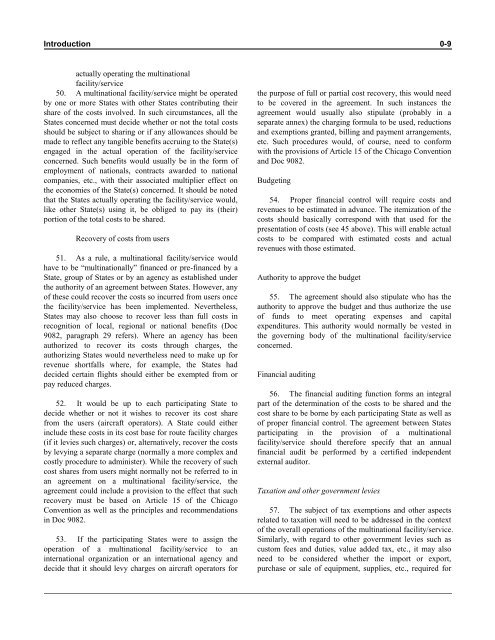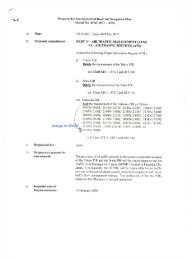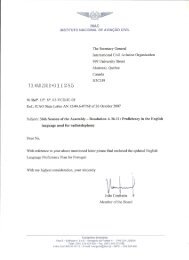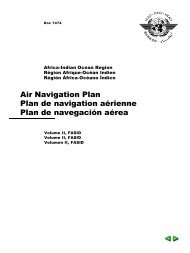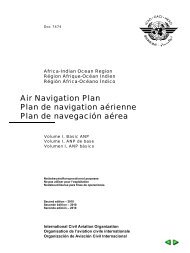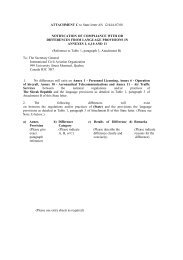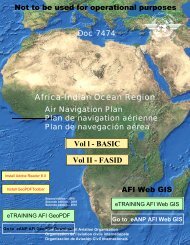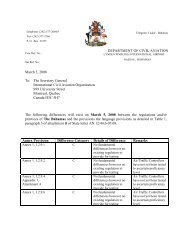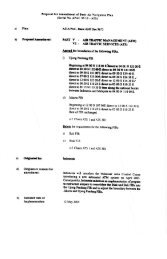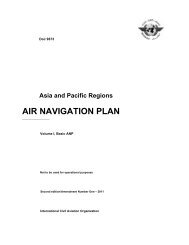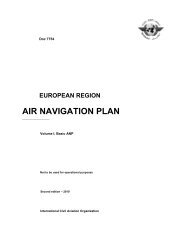7754 Vol 2 Flyleaf - ICAO Public Maps
7754 Vol 2 Flyleaf - ICAO Public Maps
7754 Vol 2 Flyleaf - ICAO Public Maps
You also want an ePaper? Increase the reach of your titles
YUMPU automatically turns print PDFs into web optimized ePapers that Google loves.
Introduction 0-9<br />
45. actually operating the multinational<br />
45. facility/service<br />
50. A multinational facility/service might be operated<br />
by one or more States with other States contributing their<br />
share of the costs involved. In such circumstances, all the<br />
States concerned must decide whether or not the total costs<br />
should be subject to sharing or if any allowances should be<br />
made to reflect any tangible benefits accruing to the State(s)<br />
engaged in the actual operation of the facility/service<br />
concerned. Such benefits would usually be in the form of<br />
employment of nationals, contracts awarded to national<br />
companies, etc., with their associated multiplier effect on<br />
the economies of the State(s) concerned. It should be noted<br />
that the States actually operating the facility/service would,<br />
like other State(s) using it, be obliged to pay its (their)<br />
portion of the total costs to be shared.<br />
45. Recovery of costs from users<br />
51. As a rule, a multinational facility/service would<br />
have to be “multinationally” financed or pre-financed by a<br />
State, group of States or by an agency as established under<br />
the authority of an agreement between States. However, any<br />
of these could recover the costs so incurred from users once<br />
the facility/service has been implemented. Nevertheless,<br />
States may also choose to recover less than full costs in<br />
recognition of local, regional or national benefits (Doc<br />
9082, paragraph 29 refers). Where an agency has been<br />
authorized to recover its costs through charges, the<br />
authorizing States would nevertheless need to make up for<br />
revenue shortfalls where, for example, the States had<br />
decided certain flights should either be exempted from or<br />
pay reduced charges.<br />
52. It would be up to each participating State to<br />
decide whether or not it wishes to recover its cost share<br />
from the users (aircraft operators). A State could either<br />
include these costs in its cost base for route facility charges<br />
(if it levies such charges) or, alternatively, recover the costs<br />
by levying a separate charge (normally a more complex and<br />
costly procedure to administer). While the recovery of such<br />
cost shares from users might normally not be referred to in<br />
an agreement on a multinational facility/service, the<br />
agreement could include a provision to the effect that such<br />
recovery must be based on Article 15 of the Chicago<br />
Convention as well as the principles and recommendations<br />
in Doc 9082.<br />
53. If the participating States were to assign the<br />
operation of a multinational facility/service to an<br />
international organization or an international agency and<br />
decide that it should levy charges on aircraft operators for<br />
the purpose of full or partial cost recovery, this would need<br />
to be covered in the agreement. In such instances the<br />
agreement would usually also stipulate (probably in a<br />
separate annex) the charging formula to be used, reductions<br />
and exemptions granted, billing and payment arrangements,<br />
etc. Such procedures would, of course, need to conform<br />
with the provisions of Article 15 of the Chicago Convention<br />
and Doc 9082.<br />
Budgeting<br />
54. Proper financial control will require costs and<br />
revenues to be estimated in advance. The itemization of the<br />
costs should basically correspond with that used for the<br />
presentation of costs (see 45 above). This will enable actual<br />
costs to be compared with estimated costs and actual<br />
revenues with those estimated.<br />
Authority to approve the budget<br />
55. The agreement should also stipulate who has the<br />
authority to approve the budget and thus authorize the use<br />
of funds to meet operating expenses and capital<br />
expenditures. This authority would normally be vested in<br />
the governing body of the multinational facility/service<br />
concerned.<br />
Financial auditing<br />
56. The financial auditing function forms an integral<br />
part of the determination of the costs to be shared and the<br />
cost share to be borne by each participating State as well as<br />
of proper financial control. The agreement between States<br />
participating in the provision of a multinational<br />
facility/service should therefore specify that an annual<br />
financial audit be performed by a certified independent<br />
external auditor.<br />
Taxation and other government levies<br />
57. The subject of tax exemptions and other aspects<br />
related to taxation will need to be addressed in the context<br />
of the overall operations of the multinational facility/service.<br />
Similarly, with regard to other government levies such as<br />
custom fees and duties, value added tax, etc., it may also<br />
need to be considered whether the import or export,<br />
purchase or sale of equipment, supplies, etc., required for


